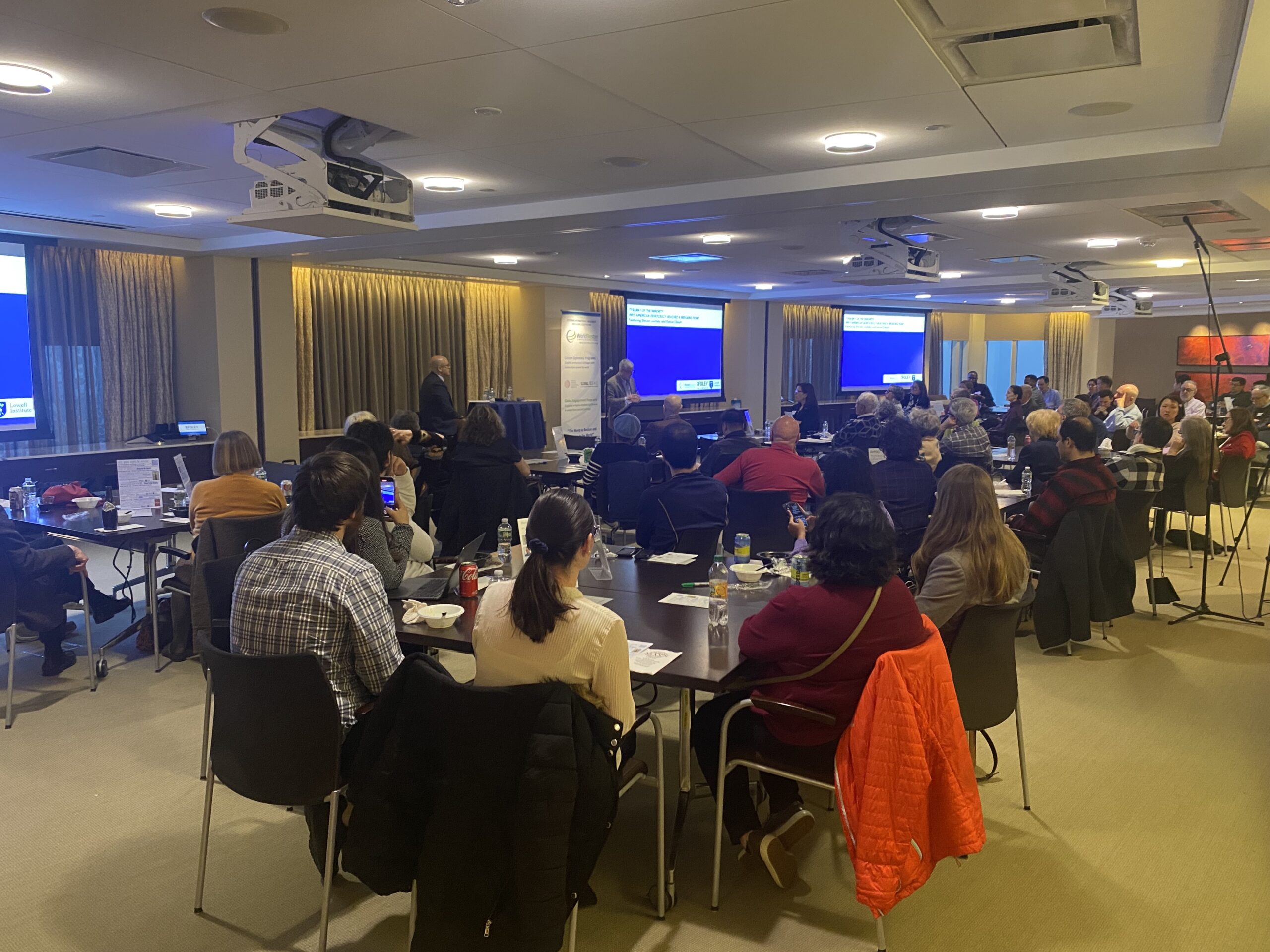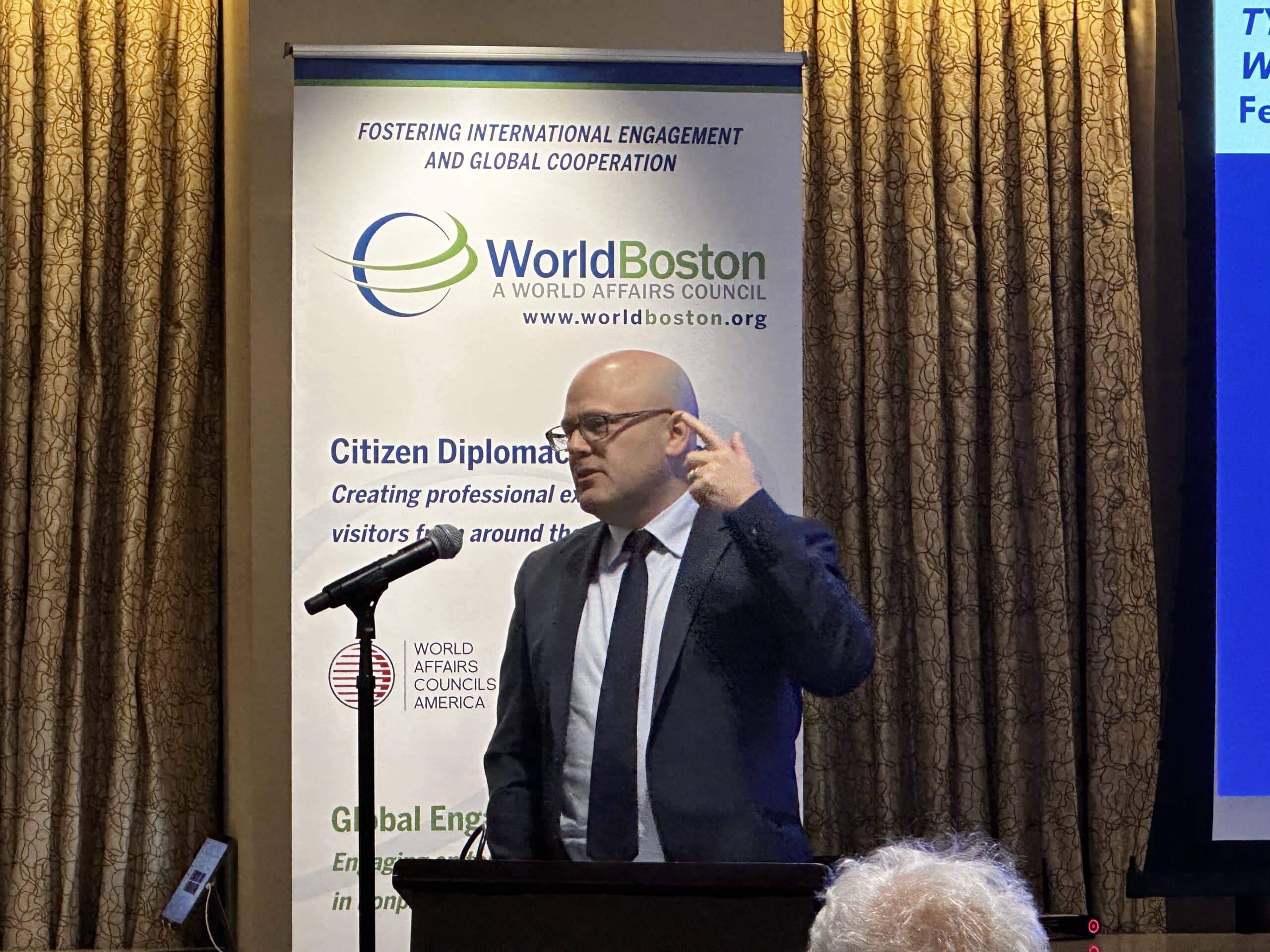
“Why does every modern U.S. election feel like a national emergency?” On March 26th, acclaimed political scientists, bestselling authors, and Harvard Professors Steven Levitsky and Daniel Ziblatt shared their perspectives during this Chat & Chowder session. The Professors argued that the United States is experiencing a democratic backslide, and semi-loyalist complacency, when people are only semi-loyal to democracy, is to blame.
The Chat & Chowder program focused on arguments from their new book, Tyranny of the Minority: Why American Democracy Reached the Breaking Point. Levitsky and Ziblatt discussed American democracy in retrograde and how the failures of the electoral system are leading to the "creeping tyranny of an authoritarian extremist minority.” Notably, WorldBoston live-streamed the talk both in English and with simultaneous interpretation to Portuguese to an online audience in Brazil, supporting their mission to foster international engagement. The event concluded with a Q&A period, a networking session, and an opportunity to purchase the aforementioned call-to-action piece.
The Great American Backslide
After WorldBoston President Mary Yntema's opening remarks, Professor Levitsky took the stage to deliver an attention-grabbing statistic, diving into the heart of the matter. According to Freedom House, the United States' democracy score plummeted from 92 in 2015 to 83 this year, tying with Romania and Argentina. Levitsky warned of a slow-burn death of democracy. In-house party preferentialism emerged as the main culprit, a key characteristic of other authoritarian-leaning nation-states.

Professor Levitsky outlined insidious methods in an autocrat's playbook to provide context for how the death of democracy could unfold in the United States, asserting that former President and current candidate Donald J. Trump would spearhead these processes. Trump as President fulfilled preconditions of a democratic backslide, such as loyalist replacements within courts to bankrupt and exhaust the opposition, and keeping civil society in check. Levitsky noted that democratic breakdown is usually preceded by violence, which is harder to identify in the U.S. but was also evident in Trump's case. Donald Trump's court proceedings after the 2020 election underscored violent threats against election workers, prosecutors, and judges. Levitsky continued, saying that retired Republican lawmakers even voted against the impeachment and conviction of Trump because they feared his wrath—a wrath animated through his speeches promising a loyalist takeover of the White House, support of vigilante justice against immigrants, a takedown of independent media, protest suppression, and general censorship of a multi-racial America's indignation.
Levitsky concluded that allowing Trump and Republican semi-loyalists to democracy to remain in office would result in an authoritarian state. "This is clear evidence of a party no longer committed to democracy," he emphasized. Quizzical looks filled the audience. Can’t the American people vote against Trump when he says he will do the very things anathema to the individual rights and freedom of the democratic majority? What explains the disjunction between what voters want and what they get?
Blame the Constitution, not the Voters:
Daniel Ziblatt posited that the Christian Democratic Union of Germany and the Tory Conservatives of the United Kingdom, sister parties of the Republican Party, have not abandoned democracy. So why is it different in the U.S.? Surprisingly, his insights had nothing to do with voter behavior. First, the U.S. proves to be a stand-out case as a majority white ethnic group is losing its numerical and dominant majority status in society. Ziblatt then referred to the Constitution as the primary source of disjunction in voting. He clarified that it contains certain undemocratic features like the Electoral College (which allows the winner of popular vote to lose the election, as happened in 2020), amongst others.
In a country with fewer extremist candidates, the popular vote tends to win, Ziblatt explained. When we see these extremist candidates getting catapulted to positions of power, "we can safely blame it on American institutions rather than the voters." Other democracies dropped these counter-majoritarianism measures over time, like Argentina, the last democracy to get rid of its Electoral College in 1994. The recipe for democratic ruin, along with the ideological and constitutional pardon of extremists, must be coupled with complacency. Ziblatt described how the Republican Party's semi-loyalists are the ones ushering in democratic breakdown by flirting with Trump’s extremism, from condoning his support of January 6th rioters to backing his claims of Democrats’ election rigging.

A Political Prescription for a Coalition:
Levitsky and Ziblatt did not get lost in doom-harbingering, and attendees listened intently to their declaration of hope. They argued for a coalition of progressives, conservatives, private-sector officials, and leftists banding together to fight extremism. In the same way that Brazil’s conservative politicians investigated efforts to overturn the results of Bolsonaro's election defeat, prioritizing democratic coalitions composed of diverse officials from AOC to Liz Cheney is the key to fighting populist extremes where the Constitution fails to do so. The authors conceded that debates over foreign policy, like in the case of Gaza, can fracture this coalition. Nevertheless, it is paramount to retain such a partnership to isolate anti-democrats and semi-loyalists. A sensitive coalition that actively raises concerns is better than no coalition because, as Ziblatt stressed, "the quickest way to refuse democracy is to refuse to talk about it."
The authors’ discussion raised some doubts within the audience during the ensuing Q&A session. They covered overarching definitions of a democratic backslide, semi-loyalists, quick descriptions of mechanisms to make voting easier, and geopolitical influences on U.S. democracy. During the networking session and book sale, many questions still flitted about the room. Is there enough of a pattern to confidently say the U.S. is going into a democratic backslide? What solutions do they have to mitigate the arising foreign policy disputes within a broad democratic coalition? Can an easier voting process qualify as a long-term solution? The authors promised that their book would answer those burning questions and more.

